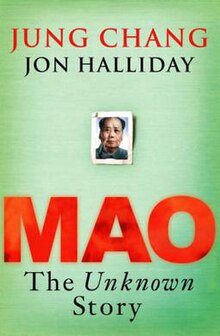Mao: The Unknown Story

First edition cover
|
|
| Author |
Jung Chang Jon Halliday |
|---|---|
| Country | United Kingdom |
| Language | English |
| Subject | Mao Zedong |
| Publisher | Jonathan Cape |
|
Publication date
|
2 June 2005 |
| Media type | Print (Hardcover) |
| Pages | 814 |
| ISBN | |
Mao: The Unknown Story is a 2005 biography of Chinese Communist leader Mao Zedong (1893–1976) written by the wife and husband team of writer Jung Chang and historian Jon Halliday, who depict Mao as being responsible for more deaths in peacetime than Adolf Hitler or Joseph Stalin.
In conducting their research for the book over the course of a decade, the authors interviewed hundreds of people who were close to Mao Zedong at some point in his life, used recently published memoirs from Chinese political figures, and explored newly opened archives in China and Russia. Chang herself lived through the turmoil of the Cultural Revolution, which she described in her earlier book, Wild Swans (1991).
The book quickly became a best-seller in Europe and North America and received overwhelming praise from reviews in national newspapers. Academic reviews from China specialists were, on the whole, mostly critical.
Chang and Halliday do not accept the idealistic explanations for Mao's rise to power or common claims for his rule. She portrays him as a tyrant who manipulated everyone and everything he could in pursuit of personal power. They argue that from his earliest years he was motivated by a lust for power and that Mao had many political opponents arrested and murdered, regardless of their relationship with him. During the 1920s and 1930s, they argue, Mao could not have gained control of the party without Stalin's patronage, nor were Mao's decisions during the Long March as heroic and ingenious as Edgar Snow's Red Star Over China claimed and thereby entered the mythology of the revolution. Chiang Kai-shek deliberately did not pursue and capture the Red Army. Chang wrote this biography to debunk the myth of Mao as an emblem of Chinese government that survives even to this day.
Areas under Communist control during the Second United Front and Chinese Civil War, such as the Jiangxi and Yan'an soviets, were ruled through terror and financed by opium. Mao, they say, sacrificed thousands of troops simply in order to get rid of party rivals, such as Chang Kuo-tao, nor did he take the initiative in fighting the Japanese invaders. Despite being born into a wealthy peasant (kulak) family, when Mao came to power in 1949 he had little concern for the welfare of the Chinese peasantry. Mao's determination to use agricultural surplus to subsidize industry and intimidation of dissent led to murderous famines resulting from the Great Leap Forward, exacerbated by allowing the export of grain to continue even when it became clear that China did not have sufficient grain to feed its population.
...
Wikipedia
